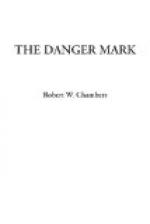Here and there a failure of some bucket-branded broker was noted—the reports echoing like the first dropping shots along the firing line.
Even to the most casual and uninterested outsider it was evident that already the metropolis was under a tension; that the tension was increasing almost imperceptibly day by day; that there seemed to be no very clear idea as to the reason of it, only a confused apprehension, an apparently unreassuring fear of some grotesque danger ahead, which daily reading of the newspapers was not at all calculated to allay.
Of course there were precise reasons for impending trouble given and reiterated by those amateurs of finance and politics whose opinions are at the disposal of the newspaper-reading public.
Prolixity characterised these solemn utterances, packed full of cant phrases such as “undigested securities” and “the treacherous attack on the nation’s integrity.”
Two principal reasons were given for the local financial uneasiness; and the one made the other ridiculous—first, that the nation’s Executive was mad as Nero and had deliberately begun a senseless holocaust involving the entire nation; the other that a “panic” was due, anyway. It resembled the logic of the White Queen of immortal memory, who began screaming before she pricked her finger in order to save herself any emotion after the pin had drawn blood.
Men knew in their hearts that there was no real reason for impending trouble; that this menace was an unreal thing, intangible, without substance—only a shadow cast by their own assininity.
Yet shadows can be made real property when authority so ordains. Because there was once a man with a donkey who met a stranger in the desert.
The stranger bargained for and bought the donkey; the late owner shoved the shekels into his ample pockets and sat down in the mule’s shadow to escape the sun; and the new owner brought suit to recover the rent due him for the occupation of the shadow cast by his donkey.
There was also a mule which waited seven years to kick.
There are asses and mules and all sorts of shadows. The ordinance of authority can affect only the shadow; the substance is immutable.
Among other serious gentlemen of consideration and means who had been unaccustomed to haunt the metropolis in the dog days was Colonel Alexander Mallett, President of the Half Moon Trust Company, and incidentally Duane’s father.
His town-house was still open, although his wife and daughter were in the country. To it, in the comparative cool of the August evenings, came figures familiar in financial circles; such men as Magnelius Grandcourt, father of Delancy; and Remsen Tappan, and James Cray.
Others came and went, men of whom Duane had read in the newspapers—very great men who dressed very simply, very powerful men who dressed elaborately; and some were young and red-faced with high living, and one was damp of hair and long-nosed, with eyes set a trifle too close together; and one fulfilled every external requisite for a “good fellow”; and another was very old, very white, with a nut-cracker jaw and faded eyes, blue as an unweaned pup’s, and a cream-coloured wig curled glossily over waxen ears and a bloodless and furrowed neck.




